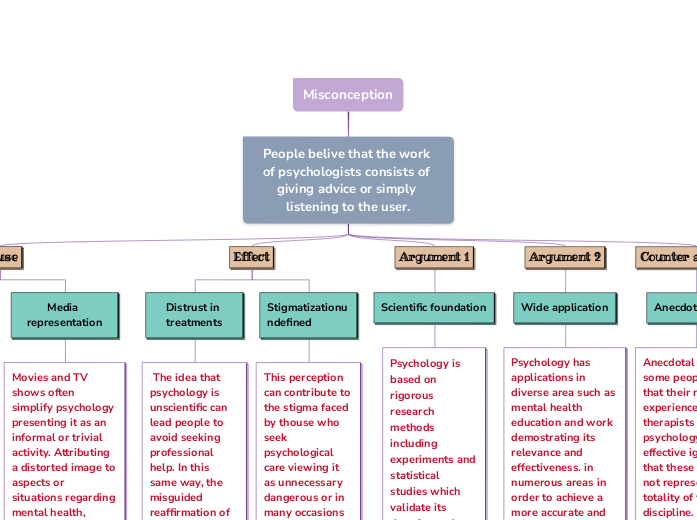af MELISSA SCARLETT CASTILLO ROMERO 9 måneder siden
71
diagrama

af MELISSA SCARLETT CASTILLO ROMERO 9 måneder siden
71

Mere som dette
Anecdotal cases some people argue that their negative experiences with therapists or psychology is not effective ignoring that these cases do not represent the totality of the discipline. However, it must also be taken into account that sometimes the therapy or the psychotherapist does not reach the expectations budgeted by the user and sometimes the user prefers to leave the therapy either because he/she is not willing to work on the confrontations that the psychologist represents, this has to do with the rapport or attachment generated between the user and the psychotherapist or because he/she is consciously or unconsciously self-sabotaging.
Psychology has applications in diverse area such as mental health education and work demostrating its relevance and effectiveness. in numerous areas in order to achieve a more accurate and precise scope of how to merge the multidisciplines required depending on the needs or complaints of users covering all types of problems and different ways to overcome the therapeutic objective either individually or in groups.
Psychology is based on rigorous research methods including experiments and statistical studies which validate its theories and practices. At present there is enough evidence to demonstrate or support the postulated theories or research or experiments that can be performed and tested in a systematic and rigorous way for replication. There are also numerous tools to put into practice the veracity of the facts or evidence available regarding mental health.
This perception can contribute to the stigma faced by thouse who seek psychological care viewing it as unnecessary dangerous or in many occasions invasive with respect to the limits to which the user is willing to go beyond. This can produce social isolation or an outright refusal to ask for help or support if there is no psychoeducation involved, affecting the emotional, physical and psychological state of the user.
The idea that psychology is unscientific can lead people to avoid seeking professional help. In this same way, the misguided reaffirmation of beliefs about what it means to go to therapy increases the likelihood that people will choose not to trust therapists or mental health issues, a stance that is far more skeptical and far removed from the vulnerability needed to begin to create a therapeutic bond.
Movies and TV shows often simplify psychology presenting it as an informal or trivial activity. Attributing a distorted image to aspects or situations regarding mental health, creating a simplistic and general representation of the interaction in therapy. also suffers the cost of an excessive dramatization which leads to a cliché, causing an unprofessional or unethical look in the therapeutic bond.
Many people are unaware of the academic and scientific training that psychologist. And at the same time people continue to have mistaken ideas or beliefs about how therapy works or the role of the psychologist in the therapeutic bond. Reaffirming the idea that only “crazy” people or people with “serious” or “insurmountable” problems should attend therapy.